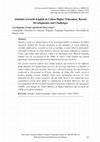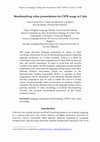Papers by Frank van Splunder
Tijdschrift voor onderwijsrecht en onderwijsbeleid. - Brussel, 1991, currens, 2014
DergiPark (Istanbul University), Sep 3, 2015
This paper reports on the use of English as a medium of instruction in a multilingual context. Wh... more This paper reports on the use of English as a medium of instruction in a multilingual context. While most students are either from the Expanding Circle or from the Outer Circle, most lecturers are from the Expanding Circle. Very few (if any) are from the Inner Circle. The case study focuses on the students' written English. It finds that students who write 'native-like' English have a clear advantage. Students from the Outer Circle who use localized varieties of English face particular problems of intelligibility. The paper argues that English may not be the 'common language' it is often believed to be, and that it may introduce new inequalities.
Routledge eBooks, Nov 27, 2019
Tijdschrift voor onderwijsrecht en onderwijsbeleid. - Brussel, 1991, currens, 2011
Routledge eBooks, Nov 27, 2019
Routledge eBooks, Nov 27, 2019
Bloomsbury Academic eBooks, Mar 29, 2015

Palgrave Macmillan UK eBooks, 2016
This chapter aims to reveal underlying language ideologies regarding English-medium instruction (... more This chapter aims to reveal underlying language ideologies regarding English-medium instruction (EMI) in a non-English-speaking context. The case study is based on a comparison between Flanders (the Dutch-speaking part of Belgium) and Finland. In both areas, the ‘national’ language played a seminal role in the construction of a common identity, while in today’s academic context, there is an increasing demand for English. Thus, measures have been taken to ‘promote’ the nation’s language while at the same time introducing EMI. The analysis draws on language policy research and critical discourse analysis to explore how discourses on one’s language and identity are reflected in language policies regarding EMI in Flanders and in Finland. The analysis takes into account the socio-historical context in both regions, and it focuses on current ‘texts in context’ (legislation, university policy). The analysis reveals that Flanders adheres to essentialist views regarding language, whereas Finland takes a more pragmatic approach, which may be due to the fact that Finland was established as an independent nation-state in 1917, whereas Flanders may be regarded as an emerging nation-state.
Routledge eBooks, Nov 27, 2019
Amsterdam University Press eBooks, Oct 19, 2021
<jats:p>English is f irmly rooted in Flemish academia, in spite of restrictions imposed by ... more <jats:p>English is f irmly rooted in Flemish academia, in spite of restrictions imposed by the Flemish government. The government's language policy is informed by the view that Dutch (Flanders' official language) should be promoted and that the use of languages other than Dutch should be managed carefully. Yet English has become the dominant 'other' language in Flemish higher education, including as an additional medium of instruction. Even though English is widely used, it is also a matter of public debate, touching on issues concerning identity, equality, and justice. In comparison with the Netherlands, the Englishization of higher education remains fairly limited, yet English is far more prominent in the north of Belgium (Dutch-speaking Flanders) than in the south (French-speaking Wallonia).</jats:p>

English is used as a lingua franca in an increasing number of domains. In higher education, Engli... more English is used as a lingua franca in an increasing number of domains. In higher education, English has become prominent as the language of course materials, scientific publications, research as well as teaching, a trend which is particularly noticeable in Europe. In Latin America, however, the surge of English is relatively recent, and within Latin America, Cuba is an interesting case. Whereas learning English was not encouraged in the 1980s, in today's Cuba English has gained importance, and learning and teaching English has become a priority. The current research explores how Cuban students and lecturers of two different fields (English and Engineering) perceive the growing importance of English in today's higher education in Cuba. Data were collected by means of a questionnaire conducted at Universidad de Oriente, Santiago de Cuba. The results reveal a positive attitude towards English, which most participants perceive as very important for their career prospects. On the other hand, it was found that most respondents overrate their ability to communicate in English. Moreover, they are not acquainted with the Common European Framework of Reference for Languages (CEFR), even though the Cuban Ministry of Higher Education has accepted the CEFR as its official standard.
Bu calismada Ingilizce'nin cokdilli bir ortamda ogretim dili olarak kullanimi incelenmektedir... more Bu calismada Ingilizce'nin cokdilli bir ortamda ogretim dili olarak kullanimi incelenmektedir. Ogrenciler Genisleyen Cember veya Orta Cember'den gelmekte olsa da ogretmenlerin cogu Genisleyen Cember'den gelmektedir. Cok az bir kesimse Dis Cember'dendir. Bu vaka incelemesi ogrencilerin yazili Ingilizce kullanimina odaklanmaktadir.Ingilizce'de ana dili gibi yazi yazabilen ogrencilerin belirgin bir avantaji bulundugu gorulmustur. Dis Cember'den gelen ve Ingilizce'nin yerel degiskelerini kullanan ogrencilerse anlasilirlik sorunu yasamaktadir. Bu calismada Ingilizce'nin genelde kabul edildigi gibi 'ortak dil' olmayabilecegini ve yeni esitsizlikler yaratabilecegi iddia edilmektedir.

This paper discusses language assessment by means of video recordings, particularly its use for b... more This paper discusses language assessment by means of video recordings, particularly its use for benchmarking purposes regarding language proficiency in a Cuban academic context. It is based on videotaped oral presentation assignments of Cuban PhD students for peer and teacher assessment. In order to avoid bias and provide validity to the results, the PhD students' videotaped oral presentation assignments have been rated by language testing experts from three different Flemish universities, which are included in the Interuniversity Testing Consortium (IUTC). A selection of these assignments will be transferred to the university Moodle platform, and this compilation may be used to enable the start of a Cuban corpus of internationally rated presentations of academic English. Therefore, the results obtained will provide language teachers with a growing database of video recordings to facilitate benchmarking activities and promote standardized assessment in the Cuban academic context.

Journal of English-Medium Instruction
In Flemish higher education, lecturers teaching in a language other than their mother tongue need... more In Flemish higher education, lecturers teaching in a language other than their mother tongue need official proof of their C1 level in that language. As a result, Flemish universities developed the ITACE (Interuniversity Test of Academic English), a domain-specific and purpose-built language test linked to the Common European Framework of Reference for Languages (CEFR) and validated by an independent audit commission. Yet, the introduction of a mandatory language test was heavily contested in Flemish academia and in the media. In addition, the ITACE was perceived as a political tool of the government to enforce its language policy. Almost ten years after its introduction, the ITACE now appears to be widely accepted. The introduction of the test revealed that initial scepticism can be overcome through development, proper contextualization, and use of a high-quality, target-specific instrument. The article discusses the context in which the test was created, the construction of the tes...
Uploads
Papers by Frank van Splunder
Autonomous learning means that students should have a ‘capacity for detachment, critical reflection, decision-making, and independent action’ (Little, 1991). It is a capacity taken for granted with PhD students applying for a scholarship in a global context. Moreover, in an academic environment, this capacity needs to be displayed in English. As an entry ticket to this
world, candidates have to provide valid certificates proving their level of English. However, do
these certificates also cover their autonomy (in English) in working, studying, networking at their
host universities?
In the process of project design and implementation, stakeholder expectations need to be
regularly consulted. Since 2004, Flanders (Belgium) and Cuba have cooperated in capacity
building projects for research in human and natural sciences, engineering and technology
in higher education, granting joint PhDs to Cuban students (http://www.vliruos.be), with
the use of English as the lingua franca. This certification requirement has so far been an
internal issue with many pitfalls and frustrations on both sides, as criteria were debatable
and requirements of the Flemish host universities differing. In 2013, we started a transversal
project at Universidad de Oriente (Santiago de Cuba) to find out how local tests may cross-
fertilize with standardized international tests, and hopefully lead to the launch of an official
language testing center by 2018, when the project ends. Recent political evolutions in Cuba
have made this undertaking all the more adamant as the local situation now presses for
more robust test validity and for assessment literacy from all stakeholders. As emphasized
by different speakers at the recent Language Testing Literacy Symposium at Lancaster
University (2016), this endeavor should include not only the testers and language instructors,
but also the test users and university administrators.
Following Morris and Baddache’s (2012) five-step approach to stakeholder engagement, this
poster outlines the perspectives of different stakeholders at the Universidad de Oriente with
respect to the assessment and certification of English language proficiency. Building on the
stakeholder mapping exercise in Van Maele, Rodríguez González, Díaz Moreno, van Splunder and Baten (2015), in which we identified the most important stakeholder groups, we will now focus on the perspectives of the internal stakeholder groups, notably the language instructors, project leaders, PhD students, and university leadership on the Cuban side as well as the project leaders on the Flemish side. We will define the various engagement strategies and how to prepare for them, evaluate prior and on-going engagement actions, and report on the impact of the language assessment literacy trainings that have taken place.